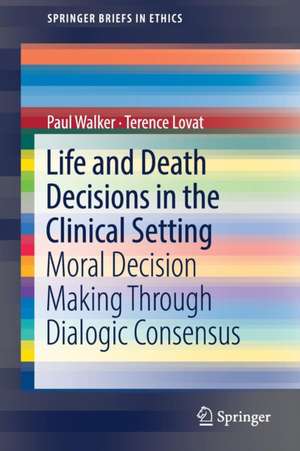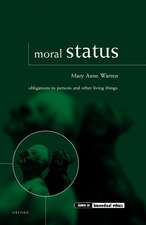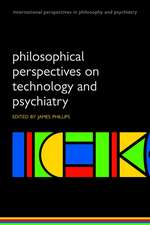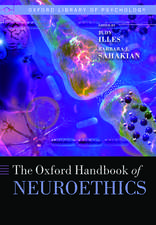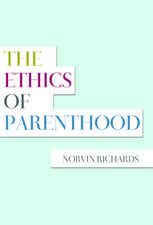Life and Death Decisions in the Clinical Setting: Moral decision making through dialogic consensus: SpringerBriefs in Ethics
Autor Paul Walker, Terence Lovaten Limba Engleză Paperback – 27 mar 2017
Din seria SpringerBriefs in Ethics
-
 Preț: 84.28 lei
Preț: 84.28 lei -
 Preț: 377.18 lei
Preț: 377.18 lei -
 Preț: 343.13 lei
Preț: 343.13 lei -
 Preț: 353.67 lei
Preț: 353.67 lei -
 Preț: 377.18 lei
Preț: 377.18 lei -
 Preț: 408.44 lei
Preț: 408.44 lei -
 Preț: 474.84 lei
Preț: 474.84 lei -
 Preț: 343.21 lei
Preț: 343.21 lei -
 Preț: 378.71 lei
Preț: 378.71 lei -
 Preț: 410.77 lei
Preț: 410.77 lei -
 Preț: 377.95 lei
Preț: 377.95 lei -
 Preț: 378.34 lei
Preț: 378.34 lei - 15%
 Preț: 461.87 lei
Preț: 461.87 lei -
 Preț: 414.72 lei
Preț: 414.72 lei -
 Preț: 478.53 lei
Preț: 478.53 lei - 15%
 Preț: 461.73 lei
Preț: 461.73 lei -
 Preț: 377.95 lei
Preț: 377.95 lei -
 Preț: 376.80 lei
Preț: 376.80 lei -
 Preț: 377.95 lei
Preț: 377.95 lei -
 Preț: 477.34 lei
Preț: 477.34 lei -
 Preț: 350.81 lei
Preț: 350.81 lei -
 Preț: 377.95 lei
Preț: 377.95 lei -
 Preț: 174.24 lei
Preț: 174.24 lei -
 Preț: 477.17 lei
Preț: 477.17 lei -
 Preț: 476.57 lei
Preț: 476.57 lei -
 Preț: 476.79 lei
Preț: 476.79 lei -
 Preț: 478.71 lei
Preț: 478.71 lei -
 Preț: 174.83 lei
Preț: 174.83 lei -
 Preț: 259.41 lei
Preț: 259.41 lei -
 Preț: 259.57 lei
Preț: 259.57 lei -
 Preț: 408.44 lei
Preț: 408.44 lei -
 Preț: 259.19 lei
Preț: 259.19 lei -
 Preț: 410.55 lei
Preț: 410.55 lei - 15%
 Preț: 463.03 lei
Preț: 463.03 lei -
 Preț: 411.16 lei
Preț: 411.16 lei - 15%
 Preț: 463.03 lei
Preț: 463.03 lei -
 Preț: 475.06 lei
Preț: 475.06 lei -
 Preț: 374.08 lei
Preț: 374.08 lei -
 Preț: 375.45 lei
Preț: 375.45 lei
Preț: 408.82 lei
Nou
Puncte Express: 613
Preț estimativ în valută:
78.25€ • 85.03$ • 65.77£
78.25€ • 85.03$ • 65.77£
Carte tipărită la comandă
Livrare economică 21 aprilie-05 mai
Preluare comenzi: 021 569.72.76
Specificații
ISBN-13: 9789811043000
ISBN-10: 9811043000
Pagini: 68
Ilustrații: X, 68 p.
Dimensiuni: 155 x 235 x 4 mm
Greutate: 0.12 kg
Ediția:1st ed. 2017
Editura: Springer Nature Singapore
Colecția Springer
Seria SpringerBriefs in Ethics
Locul publicării:Singapore, Singapore
ISBN-10: 9811043000
Pagini: 68
Ilustrații: X, 68 p.
Dimensiuni: 155 x 235 x 4 mm
Greutate: 0.12 kg
Ediția:1st ed. 2017
Editura: Springer Nature Singapore
Colecția Springer
Seria SpringerBriefs in Ethics
Locul publicării:Singapore, Singapore
Cuprins
Chapter 1: Introduction: The current dilemma and the need for moral philosophy.- Chapter 2: Traditional approaches to ethical decision-making.- Chapter 3: Balancing old and new approaches: Principlism versus Proportionism.- Chapter 4: The foundations and benefits of discourse consensus.- Chapter 5: Challenges facing discourse consensus.- Chapter 6: Conclusion: Looking to the future of moral decision-making in clinical settings.
Recenzii
“The authors offer a brief yet robust overview of moral philosophy and propose a novel process of dialogic consensus for the resolution of moral dilemmas in the clinical setting. … written for healthcare professionals who lack a background in philosophy. It is most relevant to those who work in acute care settings where a majority of moral disagreements arise, but the method of dialogic consensus is relevant to all members of the healthcare field as well as interdisciplinary professionals.” (Sarah Sawicki, Doody’s Book Reviews, June, 2017)
Notă biografică
Paul Walker is Conjoint Associate Professor in Surgery and the Clinical Unit in Ethics and Health Law, Faculty of Health and Medicine, the University of Newcastle, Australia, and a practicing paediatric otolaryngologist. Paul’s research examines moral decision-making in medicine, including its implications for medical education. He is a Fellow of the Royal Australasian College of Surgeons and of the American College of Surgeons, a member of the Royal Australasian College of Surgeons Ethics Committee, the Australian and New Zealand Society of Paediatric Otolaryngology (President-elect), the American Society of Pediatric Otolaryngology, the Australian Association of Bioethics and Health Law and the Australian Association of Philosophy.
Terence Lovat is Emeritus Professor and Postgraduate Theology Convenor in the School of Humanities and Social Science, the University of Newcastle, Australia, and Honorary Research Fellow at Oxford University, UK. Terry is a former Pro Vice
-Chancellor, Dean and Chair of the University’s Human Research Ethics Committee. He has served on the Board of the Australian Council of Deans of Education, including as President, as an Executive member of the Deans of Arts Social Sciences and Humanities, on the Executive of the NSW Teacher Education Council, including as President, on the inaugural Board of the Carrick Institute for Learning and Teaching in Higher Education (later ALTC) and the National Inquiry into the Teaching of Literacy. Terry teaches and researches in the discipline areas of philosophy, religion and theology, ethics and education, and has a particular interest in matters of Islamic versus Judaeo-Christian theology, religion, ethics and values in their application to education, moral philosophy and bioethics. His earlier work (with Mitchell and Kerridge), Bioethics and Clinical Ethics for Health Care Professionals (1996), became a standard text in many medical and healthcare training programs.
Terence Lovat is Emeritus Professor and Postgraduate Theology Convenor in the School of Humanities and Social Science, the University of Newcastle, Australia, and Honorary Research Fellow at Oxford University, UK. Terry is a former Pro Vice
-Chancellor, Dean and Chair of the University’s Human Research Ethics Committee. He has served on the Board of the Australian Council of Deans of Education, including as President, as an Executive member of the Deans of Arts Social Sciences and Humanities, on the Executive of the NSW Teacher Education Council, including as President, on the inaugural Board of the Carrick Institute for Learning and Teaching in Higher Education (later ALTC) and the National Inquiry into the Teaching of Literacy. Terry teaches and researches in the discipline areas of philosophy, religion and theology, ethics and education, and has a particular interest in matters of Islamic versus Judaeo-Christian theology, religion, ethics and values in their application to education, moral philosophy and bioethics. His earlier work (with Mitchell and Kerridge), Bioethics and Clinical Ethics for Health Care Professionals (1996), became a standard text in many medical and healthcare training programs.
Textul de pe ultima copertă
This book moves away from the frameworks that have traditionally guided ethical decision-making in the Western clinical setting, towards an inclusive, non-coercive and, reflective dialogic approach to moral decision-making. Inspired in part by Jürgen Habermas’s discourse theory of morality and principles of communicative action, the book offers a proportionist approach as a way of balancing out the wisdom in traditional frameworks, set in the actual reality of the clinical situation at hand. Putting this approach into practice requires having a conversation, a dialogue or a discourse, with collaboration amongst all the stakeholders. The aim of the dialogue is to reach consensus in the decision, via mutual understanding of the values held by the patient and others whom they see as significant. This book aims to underscore the moral philosophical foundations for having a meaningful conversation. Life and Death Decision in the Clinical Setting is especially relevant in our contemporary era, characterised medically by an ever-increasing armamentarium of life-sustaining technology, but also by increasing multiculturalism, a multiplicity of faiths, and increasing value pluralism.
Caracteristici
Captures the dilemma often faced in moral decision-making in clinical settings Offers an ethical approach to the tension between technological capacity and morality in life and death decisions Recognizes and takes account of value pluralism and multiculturalism in medical decision making Includes supplementary material: sn.pub/extras
